Secret of the High Priestess Spread
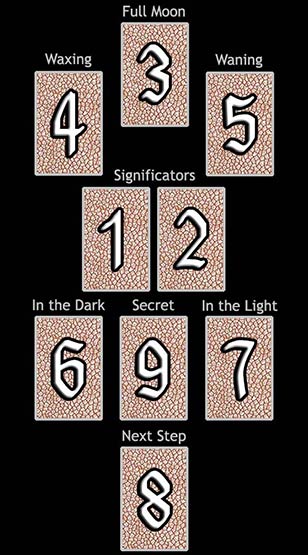
Difficulty: Average
This spread makes a nice alternative to the Celtic Cross, which covers basically the same ground. It is useful when a question doesn't quite call for the Ankh spread. This tarot spread is helpful for looking into a current trend. The High Priestess may or may not present a mysterious secret to be analysed after the rest of the spread.
1. & 2. Main impulses representing the topic at hand. They may compliment or oppose one another.
3. This is the current influence at this time.
5. The Waning Moon is the influence that is moving into the past.
4. The Waxing Moon indicates what is on the horizon, or the approaching influence. This is the immediate future.
7. The Light is what is clearly recognized, consciously.
6. The Dark indicates what is there but not fully perceived, though noticed on a deeper level of consciousness.
8. The Next Step is the near future, where this journey leads.
9. The final tarot card, only if it happens to be of the Major Arcana, reveals the Secret of the High Priestess. This is a special message that should be given added weight.
Your Secret of the High Priestess Reading
The Waxing Moon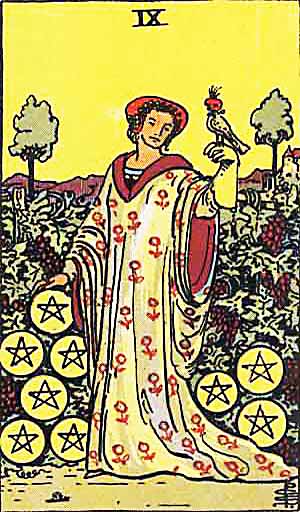 Nine of Pentacles, Reversed |
The Full Moon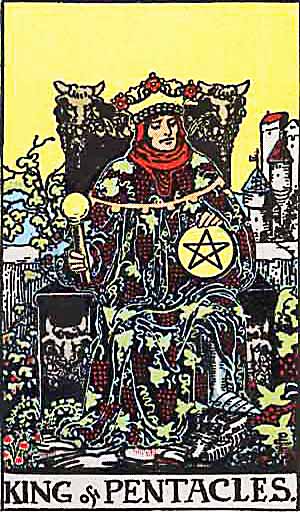 King of Pentacles, Reversed |
The Waning Moon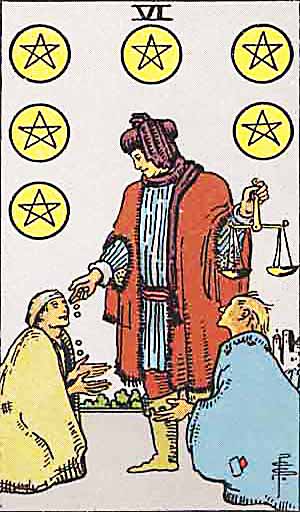 Six of Pentacles |
|
Significator #1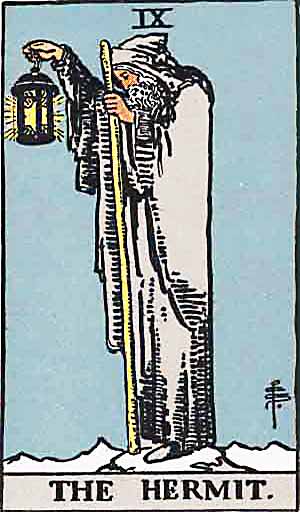 IX – The Hermit |
Significator #2 Seven of Wands, Reversed |
||
The Dark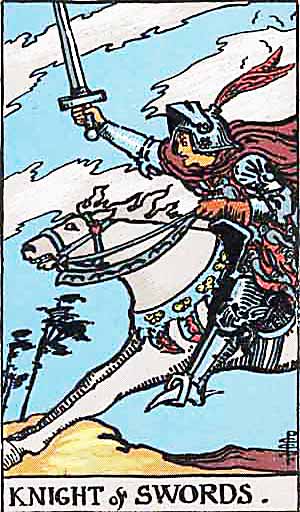 Knight of Swords |
The Secret of the High Priestess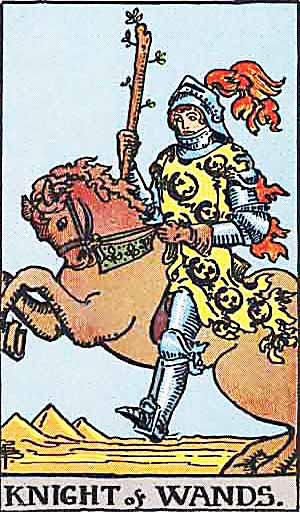 Knight of Wands, Reversed |
The Light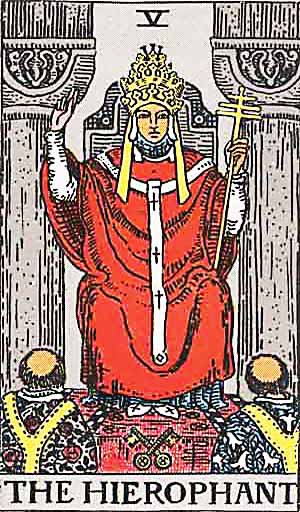 V – The Hierophant, Reversed | |
The Next Step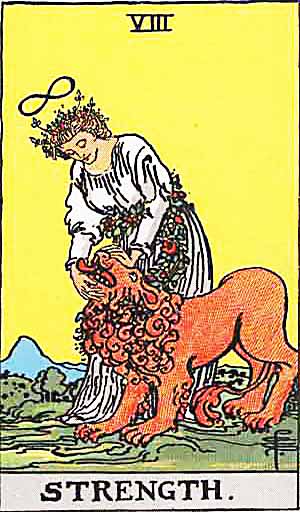 VIII – Strength, Reversed |
|||
Significator #1

IX – The Hermit
The Hermit represents solitude, introspection, wisdom, and guidance. It embodies the search for inner truth and deeper understanding through reflection and self-examination. An older figure carrying a lantern and a staff walks alone, symbolising the solitary journey towards enlightenment. The lantern represents the light of wisdom, illuminating the path ahead, while the staff signifies support and the strength gained through life experience. This card suggests a retreat from the external world to seek answers within and find clarity through introspection.
The Hermit invites you to step back from distractions, slow down, and embrace moments of solitude. It encourages personal growth through reflection, spiritual seeking, and the pursuit of knowledge that can only be found within. The Hermit is a guide, showing that wisdom comes not from external sources, but from within one's heart and mind, developed through self-discovery and careful contemplation.
In Relationships: The Hermit signifies a period of introspection, where you may need to take time for yourself before moving forward in a relationship. It suggests a need to step back and reflect on what you seek in love, away from external influences or distractions. This card encourages you to connect with your inner desires and values, understanding yourself better before committing to a romantic relationship. The Hermit also reminds us that love must start from within, and that personal growth and self-awareness are key to building healthy, fulfilling partnerships.
In Work: The Hermit suggests a time of reflection, seeking deeper meaning or purpose in one's professional life. It may indicate the need to step away from daily work life to gain clarity on one's true calling or long-term goals. This card encourages you to trust your intuition and wisdom when making career decisions and not rush into new opportunities until you have reflected on what will bring you true fulfilment. The Hermit can also point to a career in teaching, counselling, or research, where the act of guiding others or seeking knowledge is central to success.
Spiritually: The Hermit represents the pursuit of inner wisdom and enlightenment. This card invites you to withdraw from the noise of the world and focus on your inner spiritual journey. The Hermit encourages you to trust your intuition, meditate, and seek answers through spiritual practices such as prayer or self-reflection. It emphasises the importance of self-discovery and the belief that enlightenment comes from within. The Hermit also suggests that guidance from a spiritual mentor or teacher may be helpful, but the ultimate truth must be found in solitude.
Significator #2

Seven of Wands, Reversed
The Seven of Wands represents perseverance, defence, and standing your ground in the face of challenges. It indicates a time when you are confronted with competition, opposition, or criticism, but must remain firm and assertive in protecting your position or beliefs. Depicted as a figure standing on higher ground, holding a wand to defend themselves against several others below, the Seven of Wands suggests rising above obstacles and confronting adversity head-on. This card calls for courage and determination, encouraging you to defend what you have achieved or believe in when it feels like others are challenging you.
Reversed, the Seven of Wands can indicate feelings of being overwhelmed, defeated, or unable to defend your position. You may feel you are losing the battle, whether in relationships, career, or other areas of life. It suggests you might be giving up or feeling unsure of your ability to withstand challenges. The reversed Seven of Wands may also suggest a reluctance to confront opposition or fear of standing up for oneself. It advises you to reassess your position and gather your strength before moving forward. This card asks you to reclaim your confidence, remembering that you can rise above challenges, even when they seem difficult.
In Relationships: The Seven of Wands indicates tension or rivalry. This could manifest as external pressures, such as family or friends interfering, or internal struggles where both partners may experience differing needs or desires. You may need to stand your ground in protecting the relationship or asserting your boundaries. This card encourages you to remain firm and assertive in your beliefs about love and relationships, even if you face opposition from others. It may also suggest that you must fight for your connection, whether confronting misunderstandings or pushing back against external forces that threaten your unity. For single individuals, the Seven of Wands can indicate the need to stay true to your values and not be swayed by external influences in romance.
In Work: The Seven of Wands signals a time when you may be facing competition, criticism, or challenging circumstances. This card suggests you are in a position of advantage, but you must defend your place to maintain your success. The Seven of Wands indicates you will face obstacles, but it encourages you to remain strong, assertive, and confident in your abilities. It may point to the need to stand up for your ideas, work, or career goals, especially when others question or oppose them. This card advises you to avoid complacency and engage with challenges, knowing that overcoming them will only strengthen your position. It is a reminder that success often requires persistence and the ability to rise above opposition.
Spiritually: The Seven of Wands indicates a time of spiritual challenge or inner conflict, where you may feel the need to defend your spiritual beliefs or practices. The card suggests you are on a path that may be difficult to navigate, and you may face external criticism or doubt from others. However, the Seven of Wands encourages you to remain firm in your spiritual convictions and trust that you are on the right path. It also suggests you may need to stand up for your beliefs, even if you feel isolated or misunderstood. This card encourages inner strength and the courage to defend your truth while remaining open to growth and deeper understanding on the spiritual journey.
The Waning Moon is the influence that you are putting behind you, as it moves into the past.

Six of Pentacles
The Six of Pentacles represents generosity, balance, and the exchange of resources. This card embodies the energy of giving and receiving, and the importance of fairness and reciprocity in material and emotional exchanges. The figure on the card holds scales, distributing coins to those in need, symbolising the act of sharing resources fairly. The Six of Pentacles signifies a period where you may be called upon to give to others, but it also suggests you could find yourself in a position to receive help, support, or resources from others.
This card asks you to consider your relationship with abundance, generosity, and fairness. It points to the value of using resources wisely and encourages you to be mindful of how you give and receive. The Six of Pentacles suggests an opportunity to create a balance in your life by being open to both offering and accepting help. It is a reminder that giving is just as important as receiving and that both actions can create harmony and flow in your life.
In Relationships: The Six of Pentacles indicates a relationship with a healthy exchange of energy between partners. This card suggests a balance between giving and receiving, where both parties contribute equally to the relationship, whether emotionally, materially, or in terms of effort. The Six of Pentacles encourages you to consider whether the relationship is balanced or if one partner gives more than the other. If there is an imbalance, this card advises you to address the issue and ensure that both individuals are contributing fairly. The card also speaks to the idea of supporting one another in times of need and being willing to offer help and care when needed.
In Work: The Six of Pentacles suggests you may experience a period of financial stability, where you can share your resources with others or receive help or recognition for your work. This card may indicate a raise, promotion, or an opportunity to assist others. It speaks to the importance of using your success to support others and create balance within the workplace. The Six of Pentacles can also suggest that you may be in a position to mentor or share your knowledge with others, promoting fairness and equal opportunity. It encourages you to remain generous and fair in professional dealings and trust that your efforts will be reciprocated in future rewards.
Spiritually: The Six of Pentacles represents the balance between giving and receiving within one's spiritual practice. You may be in a position to share your insights, wisdom, or resources with others, or you may require guidance. This card encourages you to embrace the concept of reciprocity in your spiritual journey, understanding that growth comes not just from personal practice but also from helping others and being open to receiving insights. The Six of Pentacles reminds us that spirituality is about balance—about being generous with one's knowledge and resources but being open to receiving guidance and nourishment from others or the universe. It calls for an equal exchange of energy, whether in prayer, meditation, or community.
The Full Moon is the current influence at this time.

King of Pentacles, Reversed
The King of Pentacles represents mastery, success, and the ability to create and maintain long-term prosperity. He embodies the qualities of discipline, ambition, and practical wisdom, using his resources to build a stable and abundant life. Seated on a throne surrounded by symbols of wealth, such as a crown, a sceptre, and lush greenery, the King of Pentacles signifies someone who has achieved financial security and is now focused on maintaining and expanding that success. He is a figure of authority, leadership, and reliability, representing someone grounded who understands the material world.
Reversed, the King of Pentacles can indicate financial instability, greed, or an overemphasis on material pursuits at the expense of emotional or spiritual well-being. You may be struggling with mismanagement of resources, a lack of discipline, or an inability to create the stability you desire. This card may also suggest a tendency towards controlling or domineering behaviour, especially in relationships or career matters, or a lack of generosity despite having resources. The reversed King of Pentacles warns against becoming too focused on wealth and status, reminding you to balance material success with the need for emotional and spiritual fulfilment. It may also signal the need to reassess how resources are being managed.
In Relationships: The King of Pentacles signifies a reliable and responsible partner. This card suggests a partner committed to building a secure and lasting future together. The King of Pentacles represents someone who provides for their loved ones, not just financially but also emotionally and practically. For those seeking love, this card may indicate that a partnership with someone who shares similar values of security, stability, and long-term commitment is on the horizon. The King of Pentacles reminds you to approach love with responsibility and maturity, understanding that a successful relationship requires emotional investment and practical effort.
In Work: The King of Pentacles represents financial stability, success, and leadership. This card signifies the achievement of wealth, professional mastery, and the ability to manage resources skillfully. You may be in a position of authority, such as a business owner, CEO, or manager, or striving to reach such a position. The King of Pentacles encourages you to focus on building a solid and sustainable career, using your experience and knowledge to make wise financial decisions. This card also highlights the importance of responsibility and the ability to take care of both practical and material matters in a way that benefits not only oneself but also others, whether through mentorship, business ventures, or leadership.
Spiritually: The King of Pentacles represents grounded wisdom and stability in one's spiritual practice. This card suggests you have achieved balance and security in your spiritual life, understanding that fulfilment comes from integrating spiritual wisdom with practical action. The King of Pentacles invites you to approach your spiritual journey with discipline and focus, applying the lessons you've learned to create a stable and harmonious life. The card may also indicate that you are in a position to help others grow or have the wisdom to guide others on their path, using both practical and spiritual knowledge to create lasting change.
The Waxing Moon indicates what is on the horizon; the approaching influence.

Nine of Pentacles, Reversed
The Nine of Pentacles represents self-sufficiency, abundance, and the rewards of hard work. This card embodies the energy of enjoying the fruits of one's labour, celebrating personal achievements, and embracing the comforts of financial success. The figure on the card stands confidently in a beautiful garden, surrounded by wealth, flourishing plants, and a falcon perched on their arm—symbols of both material wealth and personal mastery. The Nine of Pentacles speaks to the satisfaction of having built a stable and prosperous life through one's efforts, where independence and security are the natural result of sustained focus and dedication.
Reversed, the Nine of Pentacles suggests a lack of fulfilment or financial insecurity. You may struggle to enjoy the rewards of your hard work or feel dissatisfied despite success. The reversed Nine of Pentacles can also indicate over-reliance on others for support, a lack of confidence, or a feeling of being unappreciated. It may suggest you do not fully embrace your own abundance or focus too much on material success without finding deeper fulfilment. The reversal of this card encourages you to reassess your relationship with independence, self-worth, and abundance, and reconnect with your sense of inner fulfilment and value.
In Relationships: The Nine of Pentacles suggests a time of personal fulfilment and independence. If you are single, this card signifies enjoying your own company, feeling content, and finding fulfilment within oneself rather than seeking validation from a partner. It represents self-love, confidence, and wholeness. The Nine of Pentacles indicates a healthy sense of independence and mutual respect between partners, where both individuals have their own sense of security and do not rely on one another for validation or fulfilment. This card emphasises that true love comes when one is already whole and complete on their own, able to contribute to the relationship from a place of abundance.
In Work: The Nine of Pentacles signifies financial stability, professional success, and personal accomplishment. It indicates a time when you are experiencing the results of your hard work, whether through promotions, recognition, or increased wealth. This card celebrates the confidence that comes with financial independence and the ability to enjoy the luxuries that hard work has earned. The Nine of Pentacles suggests you are now in a position to enjoy the fruits of your career success, whether that means achieving professional mastery or having the resources to take time for yourself. It speaks to a moment of contentment and appreciation for the abundance that has been built through persistence and dedication.
Spiritually: The Nine of Pentacles represents inner contentment, peace, and fulfilment. This card suggests you have reached a place of spiritual independence, where you are no longer reliant on external sources for validation or support. It signifies the rewards of inner growth and mastery, where you feel connected to your source of wisdom and guidance. The Nine of Pentacles encourages you to embrace your personal spiritual journey and take pride in the spiritual abundance you have cultivated. It is a reminder that spiritual fulfilment does not require outward validation, but comes from within—through self-awareness, growth, and inner peace.
The Light is what is clearly recognized.

V – The Hierophant, ReversedThe Hierophant represents tradition, spiritual guidance, conformity, and the pursuit of higher knowledge. It embodies the connection between the material and the spiritual worlds, serving as a bridge between earthly concerns and divine wisdom. The Hierophant, a spiritual leader sits between two pillars, symbolising the balance between different belief systems or realms of existence. He holds a sceptre and makes a gesture of blessing, representing his role as a guide to spiritual enlightenment and as an authority on sacred teachings.
Reversed, the Hierophant can indicate a rejection of traditional values, questioning established belief systems, or feeling trapped by convention. It may suggest that you are struggling with the pressure to conform or feeling disconnected from a spiritual or moral framework. This card reversed encourages you to explore new ways of thinking and seek personal truth, even if it goes against societal norms or expectations. It also suggests the need to break free from dogmatic thinking and find spiritual guidance that resonates with you.
In Relationships: The Hierophant speaks to the importance of tradition, commitment, and spiritual alignment. It may indicate that you seek a relationship grounded in shared values, moral beliefs, or spiritual practices. This card may also suggest the need to commit to a relationship in a formal or traditional manner, such as marriage, or to honour the teachings that come from longstanding cultural or familial expectations. The Hierophant reminds us that relationships can thrive with mutual respect, understanding, and adherence to shared principles.
In Work: The Hierophant suggests you may need to follow a structured path or seek guidance from an established authority in your field. It may mean that success can be achieved through conformity to established norms, practices, and systems. This card encourages you to pursue your professional goals with discipline and a respect for tradition, while also considering mentorship or further education to deepen your knowledge. The Hierophant may also point to a career in teaching, counselling, or religious or spiritual fields, where the transfer of knowledge is central.
Spiritually: The Hierophant represents the pursuit of spiritual knowledge through structured systems, such as religion, philosophy, or spiritual teachings. This card invites you to seek wisdom from established sources through sacred texts, a religious leader, or a disciplined spiritual practice. The Hierophant suggests the path to enlightenment can be found by following tradition, honouring teachings, and connecting to a community of like-minded individuals. It also emphasises the importance of faith, devotion, and moral integrity on the spiritual path.
The Dark shows what is there but not fully perceived, though it has been noticed on a deeper level of consciousness.

Knight of Swords
The Knight of Swords represents action, intellect, and ambition. This card embodies a bold, determined, and sometimes impulsive energy. The Knight of Swords charges forward with a clear objective, acting swiftly and decisively, fuelled by passion and mental focus. His sword symbolises the sharpness of his mind and his ability to cut through confusion, but his swift movement can sometimes result in hasty decisions or a lack of consideration for the consequences. The Knight of Swords urges you to take action with conviction and purpose, but it also cautions that moving too fast without thought may lead to mistakes or conflict.
The Knight of Swords can represent a person in your life who is assertive and direct in their communication, often quick to speak their mind and take charge. This figure may also symbolise you, urging you to embrace your intellectual strengths and assert your will, but to be mindful of the need for careful thought. This card suggests a period where quick thinking and decisive action are required to achieve success, but it reminds us that rushing into things without proper planning can be risky.
In Relationships: The Knight of Swords represents fast-paced, direct energy. You may be rushing into a relationship, desiring to move things forward quickly or to assert your desires boldly. This card suggests a time of intellectual connection, where you may be eager to discuss important matters or clear up misunderstandings. However, it may also indicate a tendency towards arguments or misunderstandings if communication is too blunt or one person is too headstrong. The Knight of Swords encourages you to speak your truth and take decisive actions in your romantic life but warns against being too forceful or rushing things without considering the feelings of others.
In Work: The Knight of Swords signifies ambition and drive. You may be pursuing your goals with passion, energy, and speed. This card suggests a time to take action and use your mind to tackle challenges head-on. However, the Knight of Swords also warns against charging forward without a coherent plan, as this could lead to burnout, mistakes, or conflict with others. You are encouraged to use your intellect and determination to push forward but to remain mindful of the bigger picture and potential consequences of your actions. This card may also indicate a new project or opportunity requiring quick thinking and bold action, where success depends on the ability to adapt and act fast.
Spiritually: The Knight of Swords represents a time of pursuing knowledge, truth, or personal growth. You may be seeking answers, trying to cut through confusion or uncertainty in your spiritual journey. This card urges you to take swift action in pursuing your goals, but it also warns against rushing into new practices or philosophies without proper reflection or understanding. The Knight of Swords can indicate a time of mental stimulation and spiritual clarity, where you may feel inspired to dive into spiritual matters. However, it also suggests intellectual understanding alone may not be enough—balance is needed with emotional wisdom and reflection. You are encouraged to use your intellect to enhance your spiritual growth but to avoid overthinking or becoming fixated on theories that might disconnect you from your intuition.
The Next Step is the near future, where this journey will take you.

VIII – Strength, Reversed
Strength represents courage, resilience, patience, and control. It embodies the power of taming inner fears, overcoming adversity with gentleness, and having the fortitude to face challenges with grace. A woman calmly holding the jaws of a lion signifies the balance between power and compassion, where strength comes not from force, but from a sense of inner calm and self-confidence. The woman's serene expression conveys that this strength is not aggressive, but is instead the ability to remain composed in the face of difficulty, harnessing personal power through self-discipline and understanding.
Reversed, Strength can indicate a lack of confidence, difficulty controlling emotions, or an overwhelming sense of vulnerability. It may suggest you are feeling weak, overwhelmed, or unable to tap into your inner strength, possibly because of fear or self-doubt. This card reversed advises you to reconnect with your sense of inner power, find calmness in the midst of chaos, and face your challenges with patience and trust in yourself. It may also indicate that you are struggling with your approach to difficult situations, possibly using force or aggression rather than compassion and patience.
In Relationships: Strength speaks to the power of patience, understanding, and unconditional love. It suggests you may be called upon to show compassion and support, particularly in times of difficulty or uncertainty. This card signifies the need for gentle, yet firm, emotional strength in navigating challenges, and reminds you that love is based on mutual respect, trust, and the ability to remain calm and supportive through all circumstances. It encourages you to act from a place of empathy, understanding that love is about partnership and compassion.
In Work: Strength represents the inner resilience needed to overcome obstacles and persevere in the face of professional challenges. It suggests your path to success will require patience, determination, and a steady hand in difficult situations. This card advises you to rely on your inner strength, confidence, and emotional intelligence to navigate challenges in the workplace, whether dealing with difficult colleagues, demanding tasks, or career setbacks. Strength encourages you to move forward with grace and conviction, trusting that inner resilience will lead you to success.
Spiritually: Strength signifies the mastery of the self, the ability to conquer one's inner demons, and the courage to follow one's spiritual path. This card calls you to dig deep within yourself for the fortitude to face your fears, heal emotional wounds, and cultivate peace. Strength emphasises that true power comes from compassion, inner harmony, and the ability to work through difficulties with faith and patience. It invites you to trust your spiritual journey and allow understanding to guide your growth.
The Secret of the High Priestess - if, and only if, this card a Major Arcana, it reveals the Secret of the High Priestess. This is a special spiritual message that you should pay extra special attention to. If it is not a trump, the Priestess has revealed no secret.

Knight of Wands, Reversed
The Knight of Wands represents boldness, adventure, and pursuing goals with passion and vigour. It embodies the energy of someone fearless, dynamic, and determined to move forward in their pursuits, no matter the obstacles. This card signifies action, enthusiasm, and a fiery drive to achieve one's ambitions. Depicted on horseback, charging forward with a wand in hand, the Knight of Wands is on a quest, eager to conquer challenges and explore new frontiers. His energy is contagious, and his confidence in the face of uncertainty encourages you to act decisively and boldly in your own life.
Reversed, the Knight of Wands can indicate impulsiveness, recklessness, or a lack of focus. You may be acting without thinking through the consequences, rushing into situations without adequate preparation, or pursuing too many projects at once. This card warns against getting swept up in the excitement of new opportunities without considering the long-term impact. The reversed Knight of Wands also suggests a loss of momentum, where you are feeling stuck, lacking the drive and energy needed to move forward. Here, you are encouraged to reassess your goals and reignite your passion with a more grounded approach. It may also indicate frustration from feeling like things are moving too slowly or not at all.
In Relationships: The Knight of Wands indicates a time of passionate energy and adventure. For those in committed relationships, this card suggests a renewed sense of excitement, spontaneity, and enthusiasm. It may represent a period of rekindled passion, where both partners are eager to explore new facets of the relationship or take risks together. For those who are single, the Knight of Wands can signify a fast-moving romantic encounter filled with excitement and intensity. However, the Knight of Wands may also point to a tendency for relationships to be temporary, encouraging you to be mindful of how quickly things progress. This card reminds you to stay true to your desires while seeking a balance between passion and stability.
In Work: The Knight of Wands represents bold action, ambition, and the drive to succeed. This card signifies a time when you should take decisive action towards your career goals. The Knight of Wands is determined, fearless, and ready to face challenges head-on, suggesting that you should embrace new opportunities, take risks, and pursue ventures confidently. It can also indicate a new, exciting job or project that requires energy and enthusiasm. While this card encourages fast movement, it also warns against rushing into things without planning. You are encouraged to harness your energy wisely, balancing excitement with practicality to avoid burnout or missteps.
Spiritually: The Knight of Wands signifies intense growth and spiritual exploration. You may feel a pull to expand your consciousness, take risks in your spiritual practices, or go on a journey of self-discovery. This card encourages you to follow your inner calling with excitement and confidence but approach spiritual exploration with an open mind and a sense of purpose. The Knight of Wands represents a spiritual quest, full of new experiences and insights. It's a time to embrace change, seek new wisdom, and venture beyond your comfort zone while staying true to the heart's deepest desires.